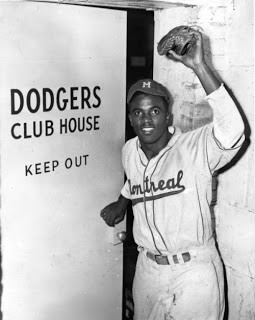"I think I can play in the big leagues. All I am asking for is the opportunity. If I fail, I'll step aside and try to so something else." - Jackie Robinson1Jackie Robinson, a man of courage, determination, and record-breaking events, was born on January 31, 1919, to a single mother who raised him along with four other siblings. This little boy grew up to change the views and opinions of African-Americans playing baseball in the Major Leagues. Jackie Robinson became the figure that would embody African-Americans competing in “a white-man’s game” and broke through that barrier of racism. Through the years growing up, Jackie competed against his older brother, Matthew Robinson, in whatever game they were playing. His older brother competed in the 1936 Berlin Olympics in the 200-meter dash, winning a silver medal just behind Jesse Owens. Matthew was the person who inspired Jackie to pursue his talents and to dream big. That is exactly what younger brother Jackie Robinson did, despite the racial controversy that lay ahead.

Jackie Robinson attended UCLA and became the first student athlete to win varsity letters in all four sports: baseball, basketball, football, and track. Unfortunately, in early 1941, just shy of graduation, Robinson left college “convinced that a college degree would not help a black man get a job during the Great Depression.”2 In the fall of 1941, Jackie moved to Honolulu, Hawaii to play football for a Semi-Professional team called the Honolulu Bears. Sadly, Robinson’s season was cut short due to his enlistment into the Army for World War II. He served in the Army from 1942 to 1944, ranking as high as 2nd Lieutenant. After being honorably discharged from the Army, Jackie Robinson’s life changed the world forever through the sport that he least excelled in, baseball.

The baseball world dealt with its own segregation views. “Segregated baseball showed the great injustice of Jim Crow, yet the Negro Leagues (the generic name for the organized black major leagues from 1920 through the 1940’s) also provided opportunities for black players, executives, and towns to thrive in unequal United States.”3 Jim Crow laws were laws that segregated facilities into white and African-American, and were common throughout the South. The game of baseball in the South only allowed White participants, players, and fans. African-American players, fans, and owners were denied and treated unjustly because of the color of their skin. “Tradition, based on deep-seated racial views of African Americans as inferior in sport, indeed, in all aspects of life, turned out to be the biggest barrier to integration.”4 Jackie Robinson broke these barriers with the help of a man named Branch Ricky.
In 1943, Branch Ricky was the president and general manager of the Brooklyn Dodgers. Ricky believed in Jackie Robinson and knew how talented he was. He wanted Robinson to be out there on the field with other Major League Baseball players, where he belonged, with the best. Branch Ricky was determined to erase the color line in baseball, and he knew Jackie Robinson would be the perfect candidate for this goal. “At the historic interview of August 28, 1945, Robinson expected to be signed to a Brown Dodgers contract but Ricky soon showed his cards. He wanted Robinson to sign with the white Dodgers and become the man who would erase the national pastime’s color line.”5 The famous dialog between Branch Ricky and Jackie Robinson started with Robinson asking Ricky a question that foreshadowed the type of player he would be in the years to come: “‘Mr. Rickey,’ asked Robinson, “do you want a ballplayer who’s not afraid to fight back?’ No, Replied the Dodgers’ president, ‘I want a ballplayer with guts enough not to fight back.’”6

A few months later, in February 1946, Robinson and his newlywed wife, Rachel Isum, his college sweetheart, traveled to Daytona Beach, Florida for the Royal’s spring training camp. “Staring down Jim Crow at Daytona Beach’s City Island Ball Park on March 17, 1946, in an exhibition between the Royals and their big league affiliate, the Dodgers, Robinson became the first black player since Moses Fleetwood Walker in 1888 to take the field against a major league team.”7 Although Robinson was known for being great at baseball, he had a slow start. During camp, when Jackie Robinson did not compete at the standard being set for him, commentators began to question his credentials and accused him of having special privileges. Without being discouraged, Robinson played the game he loved with respect and humility.
Despite how poorly Jackie Robinson was treated because of the color of his skin, he did not let other people’s opinions factor into his mindset. Teams did not want to play the Montreal Royals, because they had an African-American in the line-up. Players also tried to hurt Robinson when he was playing on the field. “In Buffalo, New York, Bison’s players spiked him as they slid into second base, knocking him out of the lineup for three weeks.”8 On April 15, 1947, playing the Boston Braves, Jackie Robinson became the first African-American to play in an official major league baseball game. The Dodgers would go on to win the National League pennant, and Jackie Robinson was named Rookie of the Year in the Major Leagues.

In the next two years, baseball began to slowly integrate; the pressure on Robinson began to ease up. Jackie Robinson went on to be known as one of the greatest baseball players of all time. He remained steadfast in his pursuit for justice and civil rights. He wrote letters to Presidents Harry S. Truman, Dwight D. Eisenhower, John F. Kennedy, and Lyndon B. Johnson thanking them for their support of civil rights. On October 24, 1972, Jackie Robinson died of a heart attack, at the age of fifty-three. His jersey number 42 was retired in 1997. In 2004, Major League Baseball proclaimed April 15th annual Jackie Robinson Day, where the players began to wear the number 42 in his honor. The tradition continues to this day.
- Thomas W. Zeiler, Jackie Robinson and Race in America: A brief history with Documents (Boston: Bedford/St. Martin’s, 2014), 80. ↵
- Thomas W. Zeiler, Jackie Robinson and Race in America: A brief history with Documents (Boston: Bedford/St. Martin’s, 2014), 3. ↵
- Thomas W. Zeiler, Jackie Robinson and Race in America: A brief history with Documents (Boston: Bedford/St. Martin’s, 2014), 6. ↵
- Thomas W. Zeiler, Jackie Robinson and Race in America: A brief history with Documents (Boston: Bedford/St. Martin’s, 2014), 9. ↵
- Thomas W. Zeiler, Jackie Robinson and Race in America: A brief history with Documents (Boston: Bedford/St. Martin’s, 2014), 17. ↵
- Thomas W. Zeiler, Jackie Robinson and Race in America: A brief history with Documents (Boston: Bedford/St. Martin’s, 2014), 17. ↵
- Thomas W. Zeiler, Jackie Robinson and Race in America: A brief history with Documents (Boston: Bedford/St. Martin’s, 2014), 20. ↵
- Thomas W. Zeiler, Jackie Robinson and Race in America: A brief history with Documents (Boston: Bedford/St. Martin’s, 2014), 21. ↵



87 comments
Alejandra Mendez
The story of Jackie Robinson always brings me so much joy. His story and actions are truly admirable and motivational. Despite his hardships and all the people wanting him to fail and the constant racism he faced, he never gave up. He knew his passion was baseball, as the article greatly supports. Also an admirable person would be Branch Ricky as his coach. Without Ricky’s support and commitment to the now baseball star, Jackie Robinson, Robinson could not have probably been as successful and as known on his own. Very well written article and very interesting topic to write about.
Marco Picardo
Great article! This proves that it does not matter where you come from, you can still succeed. Jackie showed that reaching success can come with hard work, grit, and heart. He broke down so many barriers and reached greatness while doing so. One of a kind athlete and person. Jackie’s mother should be proud raising someone like Jackie all alone. Good read.
Brianda Gomez
Even though he was not treated equally it is amazing how one of the greatest baseball players of all time was African American. I also know have more knowledge about his background. I never knew that he was in world war 2 and played more sports other than baseball. I really loved this article because it showed how Robinson did not care about other people opinions. Nothing was going to stop him from making his dreams a reality. It is truly mind blowing how he broke the barriers of racism. He truly was an amazing athlete. From winning varsity letters in more than one sport.
Cristian Medina-Lopez
This article was very well organized with the way it stated chronologically the events in his life and how he got to be the person he was. Even though I am a big baseball fan, I still learned about Jackie Robinson. Him leaving college because “Convinced that a college degree would not help a black man get a job during the Great Depression.” This is a crucial event in his life because it directed him to get enlisted into the army and later on going into baseball.
Ian Hammock
Articles like such as this one are my favorite to read. An underdog overcoming adversity to triumph in an place unfamiliar to them. In this case that underdog was not only against players in the Major League, but those whom loved the game as well as the rest of ‘White America’. This accomplishment paved the way for other athletes of color not only blacks, and aided all of America in accepting the idea of adversity.
Clarissa Bustamante
I love this article! I have such a great interest in baseball itself. Jackie Robinson was such a great hero over all. He was so unique because he was able to contribute to the Civil Rights Movement in a way he thought best. Robinson is such an inspirational person; he was able to change the way colored people were viewed in the world of baseball. He continued to live his dream no matter what people said or did to him.
Cherice Leach
This was such an interesting article to read! I don’t know much about baseball but who doesn’t know who the legendary Jackie Robinson was! It’s interesting to find out that Robinson didn’t always succeed in baseball even though he turned out to be one of the baseball greats. It’s also amazes me that he played prior sports to Major League Baseball that he was actually better at. Jackie Robinson is a great example to society for showing that even if you’re not great at something but you love to do it, you can always achieve your dreams.
Sarah Mares
Whenever I think back to the Jackie Robinson era of sports, I can’t help but admire what statements he made as an athlete and individual when it came to equality, justice and civil rights. Robinson will forever be an icon in the world of baseball, but also a celebrated role model of peace and anti-segregation, not just in sports but in society as well. This article highlights how Robinson was just a human who possessed skills and talents, and he was not willing to let the color of his skin stand in the way of his success. A true hero of equality and a decorated, self-made, hard-working athlete of the 1940’s.
Mariana Govea
What an interesting article! I have always been a fan of baseball although I do not know much history about the sport its very interesting to learn! What I really took from this article was how Jackie Robinson was ahead of his time. Mr. Robinson was more than just an African American baseball player. Thanks to people like him, multicultural players are found in all major league sports. Jackie Robinson fought for what was right and he pushed for equality not only in sports but for the real world. Very good information, great work!
Marissa Gonzalez
This article immediately caught my attention because everyone in my family, including parents, siblings, cousins and uncles, played baseball throughout their lives. Jackie Robinson is a famous icon in this sport and your article explained it thoroughly. I was not too familiar with his story but I was also not aware that he was in the army before he played. He deserves this recognition because of his hardships and a stepping stone he made for African Americans. Great article!